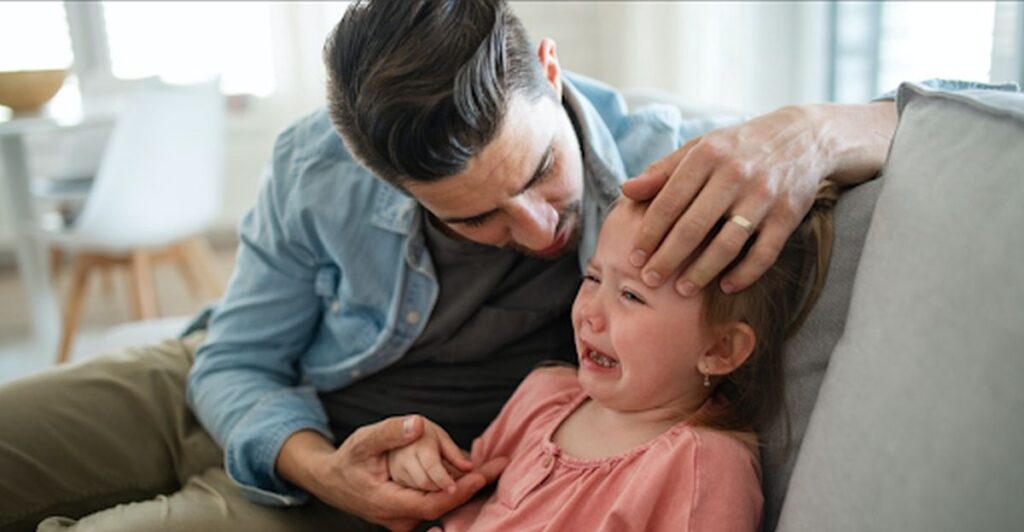When your child says hurtful words to you, they probably just need attention, love, or support. Younger kids especially are still learning how to express their internal needs, wants and wishes, while an older child might want to manifest their independence.
Children demand attention, and get it by saying all those mean things. They are testing boundaries to see what works with their parents and what doesn’t.
When that cute bundle of joy is having a meltdown and is hurling hurtful words your way, you may feel like a whirlwind of emotions. When your child says hurtful things to you, it’s easy to activate old patterns and respond with anger.
All the parenting tips you’ve read about just go out the window when your own child is acting out. This article sets out to help you understand the meaning behind this type of behavior and what can make a child say mean words.

Understanding Why your Child Says Hurtful Things To You
When your child hurts you, before reacting, you might want to take a step back and consider the intentionality behind those words. Here are some of the reasons why children choose to say hurtful things to you.
1. Seeking attention or a reaction
Children may say hurtful words when seeking attention or wanting to fulfill their needs. A child who repeatedly engages in challenging behavior may be seeking attention from their parent or caregiver.
By pushing their parents’ buttons and eliciting a reaction, children may be trying to get adults to engage with them and provide the attention they are seeking.
In those moments, it’s important for parents and other family members to respond with positivity, reinforcing good behavior, and showing love and support. By doing so, caregivers can help the child feel heard and valued, while also setting healthy boundaries for communication.
2. Feeling frustrated or overwhelmed
Children may say hurtful things when they feel frustrated or overwhelmed, which can trigger emotions like anger, anxiety, stress, or fatigue. When these feelings become too intense, children may lash out and say hurtful things to their parents, who are often their closest and safest targets.
It’s important for parents to recognize that their children’s hurtful behavior is not a reflection of their love or respect for them, but rather a signal that they need help and support to manage their emotions and navigate difficult situations.
These emotions can profoundly impact their behavior. That is why parents should address them in the first place. They can help their children when feeling frustrated or overwhelmed by providing a safe and supportive environment.
Parents can do this by encouraging open communication and practicing active listening. In addition, parents should seek to offer reassurance and comfort and help children develop healthy coping skills, such as deep breathing or mindfulness techniques. When providing healthy boundaries and routine, parents help children feel safe and in control.
Another thing you can do when your child says hurtful things to you is to offer positive reinforcement and praise for his efforts and accomplishment. This way, children can start managing their emotions better and build resilience. At the same time, this also boosts their confidence and self-esteem.
3. Testing boundaries
Children test boundaries as they explore the world and establish their sense of independence. Testing parent’s limits is a natural part of child development, as children learn through their understanding of the relationship between cause and effect. In a cause-and-effect relationship, one event leads to another.
The moment the child says those hurtful words, the parent gets upset and decides to give the matter his full attention. Be it positive or negative, it still counts as attention in the eyes of children. By testing limits, they develop an understanding about the world and build their own set of values and beliefs.
Parents and caregivers can discourage bad behavior by providing a safe and supportive environment and by setting clear and consistent boundaries. Offering choices within those boundaries can give the child a sense of control over the decisions that are being taken in the family.
One great way to help children adapt to your new rules is by offering choices within those boundaries. For example, instead of saying “no TV,” try saying “you can watch TV for 30 minutes after you finish your homework.”
This way, your child still has some control over their choices, but within the limits that you’ve set. It also develops responsibility, trust and enhances the child’s self esteem. A child that feels responsible is less likely to engage in misbehavior.
4. Imitating behavior
Another possible reason why children would use hurtful words with their parents or caregivers is that they are imitating behavior they have seen or heard from others. They repeat words they hear from peers, siblings, or the media, trying to replicate the feeling they’ve gotten while witnessing them.
Young children in particular are likely to imitate what they see on TV without understanding the meaning or implications of the words they hear.
Apart from modeling an appropriate language themselves, parents can explain why some words are considered disrespectful, hurtful, or inappropriate. When children use appropriate language, parents should praise and reinforce the behavior. This can be as simple as saying “thank you for using respectful language.”
Parent React To Hurtful Things From Children – What to Do When your Child is Mean to You
Discover effective strategies for handling challenging situations with your child – learn what to do when your child says hurtful things to you, because words can hurt, and together we can create a more positive and supportive parenting experience.

1. Don’t say hurtful things back
It is wiser to acknowledge your own emotions first and to stay away from saying hurtful things back. It can be challenging to remain calm and composed in the face of hurtful behavior.
However, when your child hurts you, responding with anger or aggression only perpetuates a negative cycle of communication. It can also damage the respect and trust that exist between the parent and the child, and leave both parties with hurt feelings. Instead, it’s important to pause, take a deep breath, and consider what to do when your child hurts you.
It’s recommended that parents respond with empathy and compassion. They can acknowledge the child’s feelings and offer support and guidance on how to express themselves in a more appropriate manner. It’s also important to model healthy communication and conflict resolution skills.
👉 Empower yourself with effective strategies to put an end to backtalk from your child! Read our comprehensive article on “How To End Your Child’s Backtalk” and gain valuable insights on understanding the root causes, setting boundaries, and fostering respectful communication.
2. Don’t scream or yell
Expressing anger verbally towards children can be unfair and potentially harmful. This can create feelings of fear, anxiety, and insecurity in the child.
Children may also internalize these negative experiences and develop negative beliefs about themselves. It’s crucial to remember that when parents hurt, it’s essential to seek healthier alternatives to manage anger and address conflicts with empathy and understanding.
What to do when your child says hurtful things to you? Remain calm and respond assertively. Address the behavior and help them understand why it’s not appropriate. Parents could explain that some words can cause great distress for some people.
Parents can suggest alternative words or phrases that children could use when wanting to express their opinions. A kind and assertive vocabulary can nurture positive relationships with others.
👉 Transform your parenting journey by practicing patience and ditching yelling! Explore our insightful article on “Practicing Patient Parenting and Avoiding Yelling at Your Kids” to discover effective strategies for creating a peaceful and nurturing environment at home.
3. Don’t use “You can’t…”
Phrases like “You can’t talk to me like that…” should be avoided when responding to children’s hurtful language. While it may seem like a simple way to set boundaries and assert authority, this phrase can come across as dismissive or invalidating of the child’s feelings and opinions.
Alternatively, parents can use reflective listening, which involves paraphrasing what the child has said and acknowledging their feelings. For example, if a child says “I hate you,” you could respond by saying “It sounds like you’re feeling really upset right now. Can you tell me more about what’s going on?”
Pause and just listen with an open mind to your child’s point of view. Children’s problems are as real to them as any problems adults might face.
4. Don’t make it a power struggle
Responding to a child’s misbehavior with anger or punishment is a recipe for disaster. It’s adding fuel to the fire, and before they know it, parents are dealing with an even bigger problem.
Power struggles often involve strong emotions, for both parties. When emotions run high, it can be exhausting to manage them and stay calm in the heat of the moment.
Because power struggles often happen over issues that are important to both the parent and the child, it’s recommended that parents approach the situation with a positive and constructive mindset.
When your child says hurtful things to you, be empathetic to the child’s needs and feelings, while also setting clear boundaries and expectations. Encourage open communication, active listening, and respectful behavior.
It’s our responsibility as parents to model healthy conflict resolution skills that children could take on in similar circumstances.
5. Don’t punish or use big consequences
Setting boundaries is essential. It gives your child the opportunity to express themselves within healthy limits. Children have a narrow perspective on the reasons behind the limits set by parents or caregivers.
They don’t understand why certain limits are in place, why some words are hurtful while others are not, and also why some words are not age-appropriate and can only be used by adults.
Children may feel constrained by limits because they can hinder their need for autonomy. That is why punishing your children or being too rigid with consequences can make them unwilling to cooperate.
For better outcomes, it’s often enough to allow natural consequences to happen. For example, when your child says hurtful things, they might lose a friend or a benefit, and that is a big deal for children.
When you allow a natural course of events to happen, children learn to adapt their behavior. They know the boundaries, they know the consequences and they make choices accordingly. Your role is to be consistent in your expectations.
Firm boundaries will help your child know what to expect and the consequences that follow. The child will begin to understand the cause and effect of their actions and start making better choices.
Natural and logical consequences prove to be more effective than arbitrary punishment. Following through with natural and logical consequences can teach children that actions have positive or negative results. They will learn to take responsibility and think twice before acting out of saying hurtful things.
What to Do When Your Child Says Hurtful Things to You

If you are a parent or caregiver, you could consider the following steps when responding to hurtful language or behavior coming from children:
1. Stay Calm
It is natural to feel offended or upset by hurtful words. It can be extremely challenging to stay calm and react assertively. Cooling down before addressing hurtful language will give you and your child the opportunity to communicate in a non-threatening way. You can start by uncovering what motivations lie behind this behavior and what your child actually needs.
While you may feel the need to scold your children and tell them how wrong it is to say such things, a better approach is to control that impulse and respond assertively. Take a moment to process your emotions and then calmly address the behavior by saying something like, “Calling someone names is not respectful or kind. Let’s talk about why you said that and what you could say instead.”
👉 Elevate your communication skills with your children and build stronger connections! Explore our informative article on “How to Communicate with Children Effectively” and discover valuable tips and techniques for fostering open, meaningful, and respectful conversations. Learn the art of active listening, positive reinforcement, and effective problem-solving.
2. Watch your body language
Children are often very perceptive to nonverbal cues, and parents’ body language can communicate a lot about their emotions and reactions. Even if you are trying to stay calm and composed, your body language can unintentionally convey aggression or anger.
Try to maintain an open and approachable posture, with relaxed shoulders, an even tone of voice, and direct eye contact. Things like crossing your arms or legs, clenching your fists, or making aggressive gestures or movements can give you away.
Be mindful of your body language, and you’ll stand better chances to show your child that you are approachable.
3. Keep Your Verbal Response Direct and Brief
While it’s important to acknowledge and address the behavior, responding with a long and emotional speech can often escalate the situation. This makes it harder for children to understand and learn from their actions. Use clear and concise language to convey your expectations and boundaries.
Avoid getting into a lengthy debate or discussion about the issue, which can make the child feel defensive or overwhelmed. Keep your tone of voice calm and neutral, avoid using sarcasm, threats, or criticism.
This way, you can help your children understand the impact of their behavior and encourage them to reflect on their actions.
4. Acknowledge your child’s emotions
When a child is mean to you, it’s recommended that you try to control the initial impulse to fight back. It can be helpful to remember that hurtful words often stem from strong emotions, such as anger, frustration, or sadness.
These emotions are common underlying issues for misbehavior in general. Keep close attention to your own feelings and actions. Remaining calm and validating your child’s emotions wil deescalate the situation. It will also make children feel safe and understood.
For example, you can try saying, ”I see you are very angry right now. It’s perfectly fine to feel like this. However, we don’t use hurtful language in this family.”
In this way children learn that it’s normal to feel strong emotions, but it is in their power to control what to do with them. Remember to be your child’s primary role model for emotional management.
5. Apologize for your part
Parents apologizing for their mistakes can teach children to take responsibility for theirs. By apologizing, you’re modeling healthy communication and conflict resolution skills.
For example, a parent might say something like, “I imagine I upset you somehow, that was not my intention. But it is not OK to say those mean angry words to me. Whenever you are ready we can talk and solve this.”
This approach can help to de-escalate the situation and create a more productive dialogue between the parent and child. This doesn’t mean taking responsibility for everything the child says or does, nor assuming fault for children’s choice of language or behavior.
This rather means that parents will try to acknowledge their contribution in creating the state of conflict. This might mean apologizing for impulsivity, choice of words, sarcasm, or other ineffective non-assertive strategies of communication they might have used.
6. Explain how words can hurt
Having a conversation with your child about the impact of hurtful words can help them understand how this behavior can impact you or others.
Start by acknowledging their feelings and showing them you understand their point of view. After that, explain that words can have a powerful impact on others, and can cause emotional pain and distress.
Describe how the words they used made you feel, such as sad, angry or frustrated. This will let them know that their words hurt you and that relationships are easily damaged when people use mean language.
Encourage your child to express feelings and opinions kindly and explain that you are there to listen and help. Remind them that there are better ways to communicate what’s on their mind and convince others and also better strategies for problem solving.
7. Show your child better ways to express emotions
It’s important to model positive communication and conflict resolution skills for your child. Speak to your child calmly and respectfully, and show them how to listen and respond.
Teach them to use “I” statements, where they can express big feelings in a healthier way. For example, they could learn to replace the classic “You’re so mean!” with “I feel hurt when you say those things to me.”
Encourage your children to take a break and calm down when they feel overwhelmed or upset. They can go to a quiet place to relax, take deep breaths, or engage in calming activities such as drawing or listening to music.
Teaching your children healthy and effective ways to express their emotions is a crucial aspect of their social and emotional development. Children who are able to communicate their feelings in a constructive and positive manner are more likely to develop strong and positive relationships with others, both now and in the future.
8. Seek outside help if necessary
Parenting can be challenging. It’s okay to seek support and guidance if you are struggling to cope with your child‘s hurtful words or behavior.
Consider reaching out to external resources to educate yourself about child behavior and ways to manage it. It can also be helpful to practice self-care and stress-management techniques, such as exercise and meditation. It will help you stay calm and centered when dealing with difficult situations.
Remember, seeking help is a sign of strength and a proactive step towards creating a happier and healthier family dynamic.
Conclusion
Approaching the situation in a constructive manner will give you more satisfying results than if you choose to react with anger, yell or punish when your child says hurtful things to you.
Choose to remain calm and focused on the underlying issues that drive the behavior. Parents should strive to model healthy communication, and teach their child alternative ways to express their emotions.
Above all, parents can choose to approach the situation with empathy, understanding, and a willingness to work together with their child to create a healthy and positive environment for everyone. If you’re seeking more impactful methods to navigate challenging moments like tantrums, hitting, or hurtful words, our complimentary online masterclass, “How to Calm You and Your Child During Tantrums, Hitting, or Yelling Hurtful Things: 4 Steps”, is the perfect opportunity. By enrolling in this course, you’ll gain access to a science-based approach that provides a step-by-step guide to effectively handle these situations.
References
Jagers, J., & Dupuis, M. M. (2019). Empathy as a mediator of the relationship between parental emotion coaching and children’s anger regulation. Journal of Child and Family Studies, 28(5), 1335-1344. http://doi.org/10.1007/s10826-019-01373-x
Barrett, P. M., Farrell, L. J., Ollendick, T. H., & Dadds, M. (2006). Long-term outcomes of an Australian universal prevention trial of anxiety and depression symptoms in children and youth: An evaluation of the friends program. Journal of Clinical Child and Adolescent Psychology, 35(3), 403-411. https://doi.org/10.1207/s15374424jccp3503_4
Hudson, J. L., Comer, J. S., & Kendall, P. C. (2008). Parental responses to positive and negative emotions in anxious and nonanxious children. Journal of clinical child and adolescent psychology : the official journal for the Society of Clinical Child and Adolescent Psychology, American Psychological Association, Division 53, 37(2), 303–313. https://doi.org/10.1080/15374410801955839
McIntyre, E. (2016). The healing power of apology in the parent-child relationship. Journal of Family Psychotherapy, 27(3), 211-225. http://doi.org/10.1080/08975353.2016.1194388
Lansford, J. E., Deater-Deckard, K., Dodge, K. A., Bates, J. E., & Pettit, G. S. (2004). Ethnic differences in the link between physical discipline and later adolescent externalizing behaviors. Journal of Child Psychology and Psychiatry, 45(2), 801-812. http://doi.org/10.1007/s10826-017-0938-7
Waller, R., Gardner, F., & Dishion, T. (2019). The importance of warmth and control in early parenting experiences on children’s social behavior and academic achievement. Journal of Child and Family Studies, 28(1), 138-147. http://doi.org/10.1007/s10826-018-1262-5









